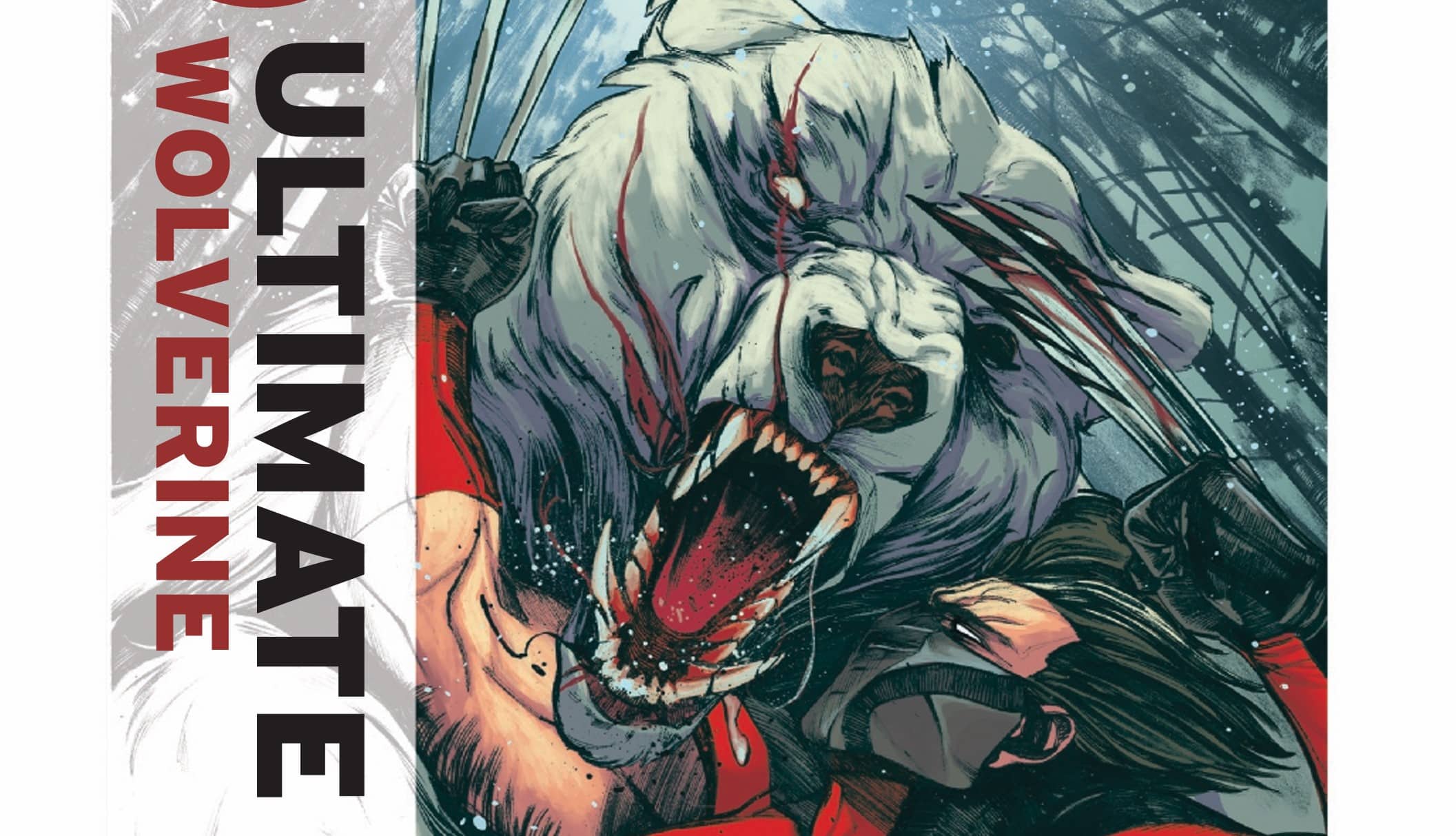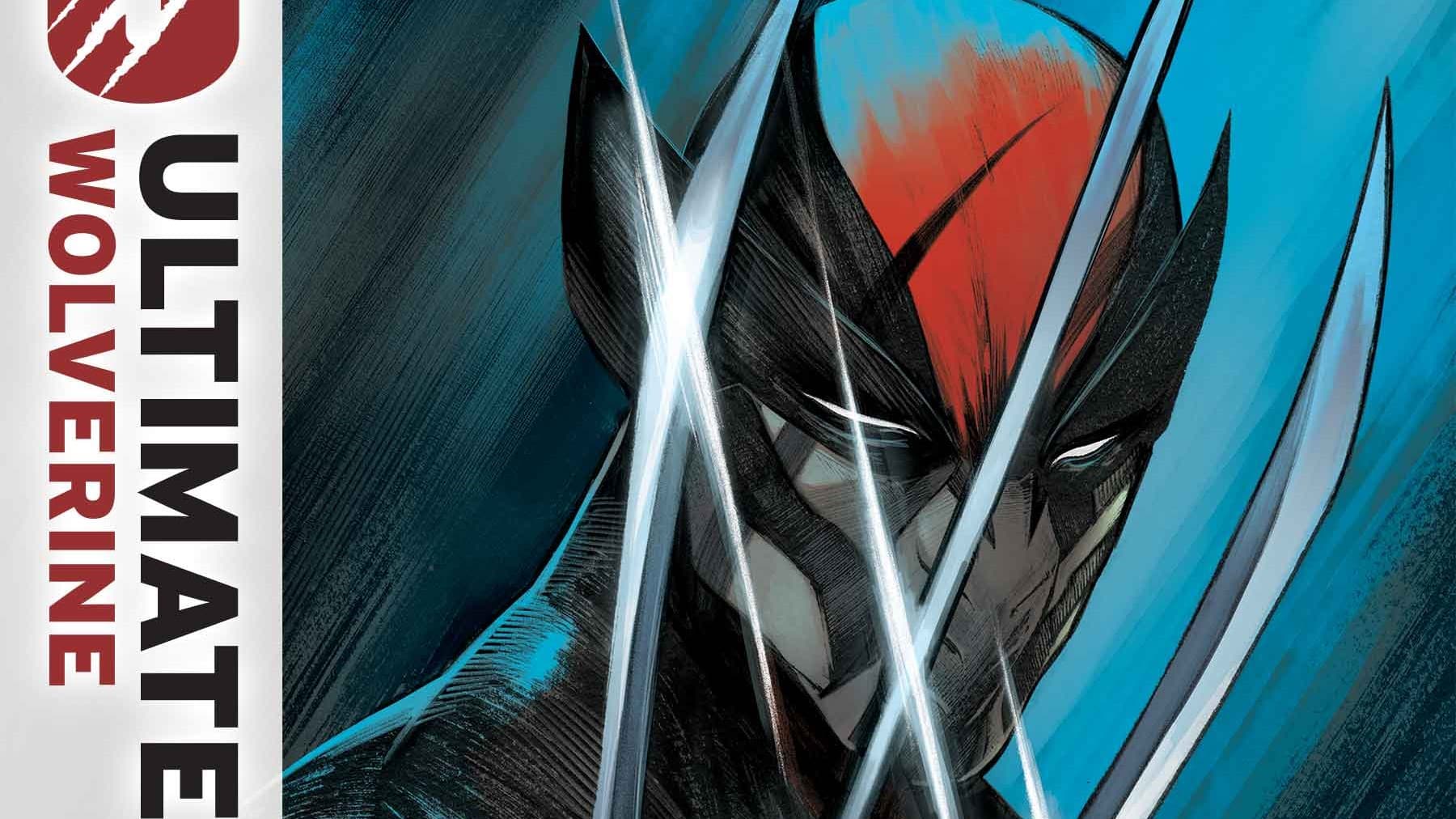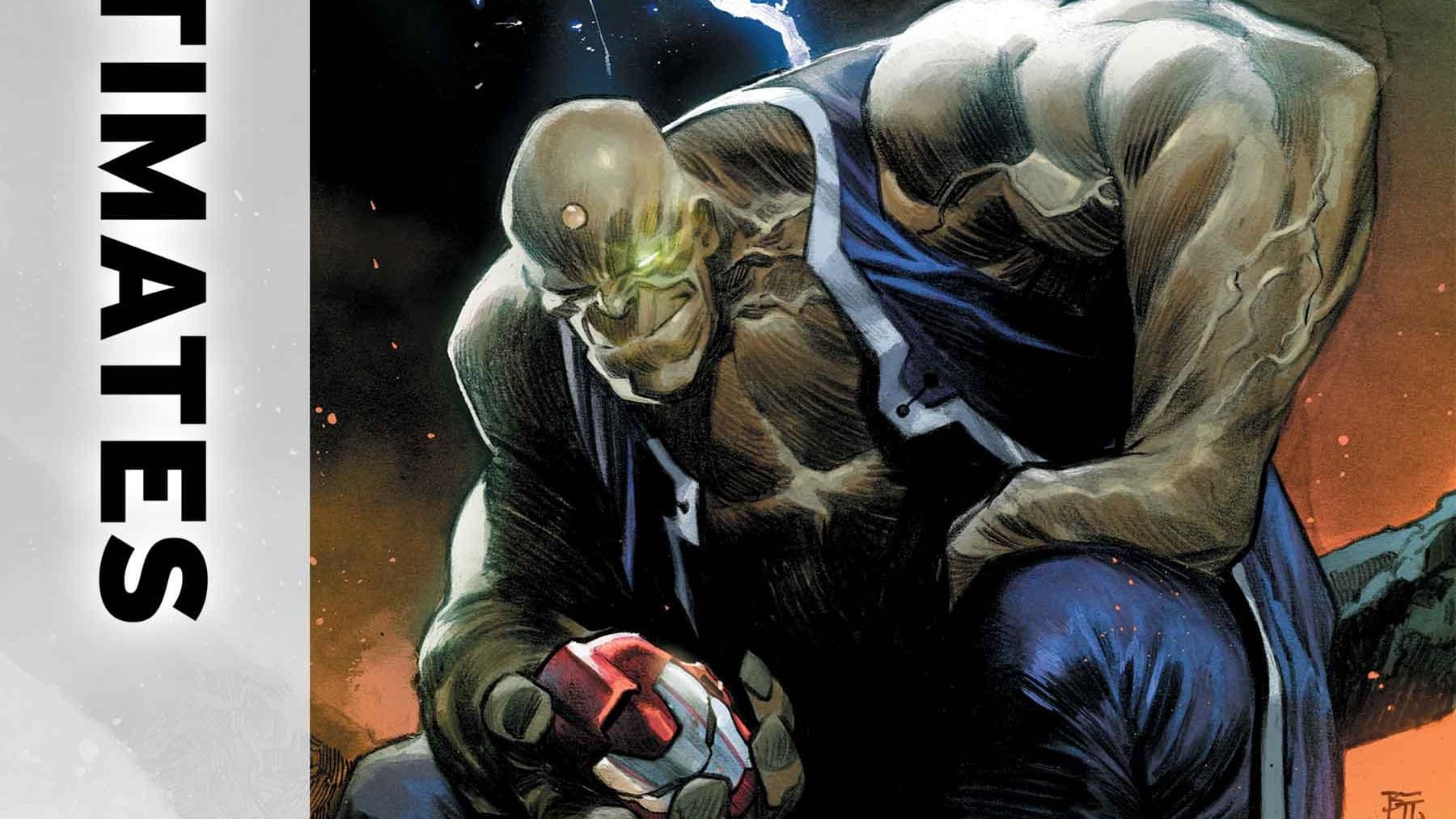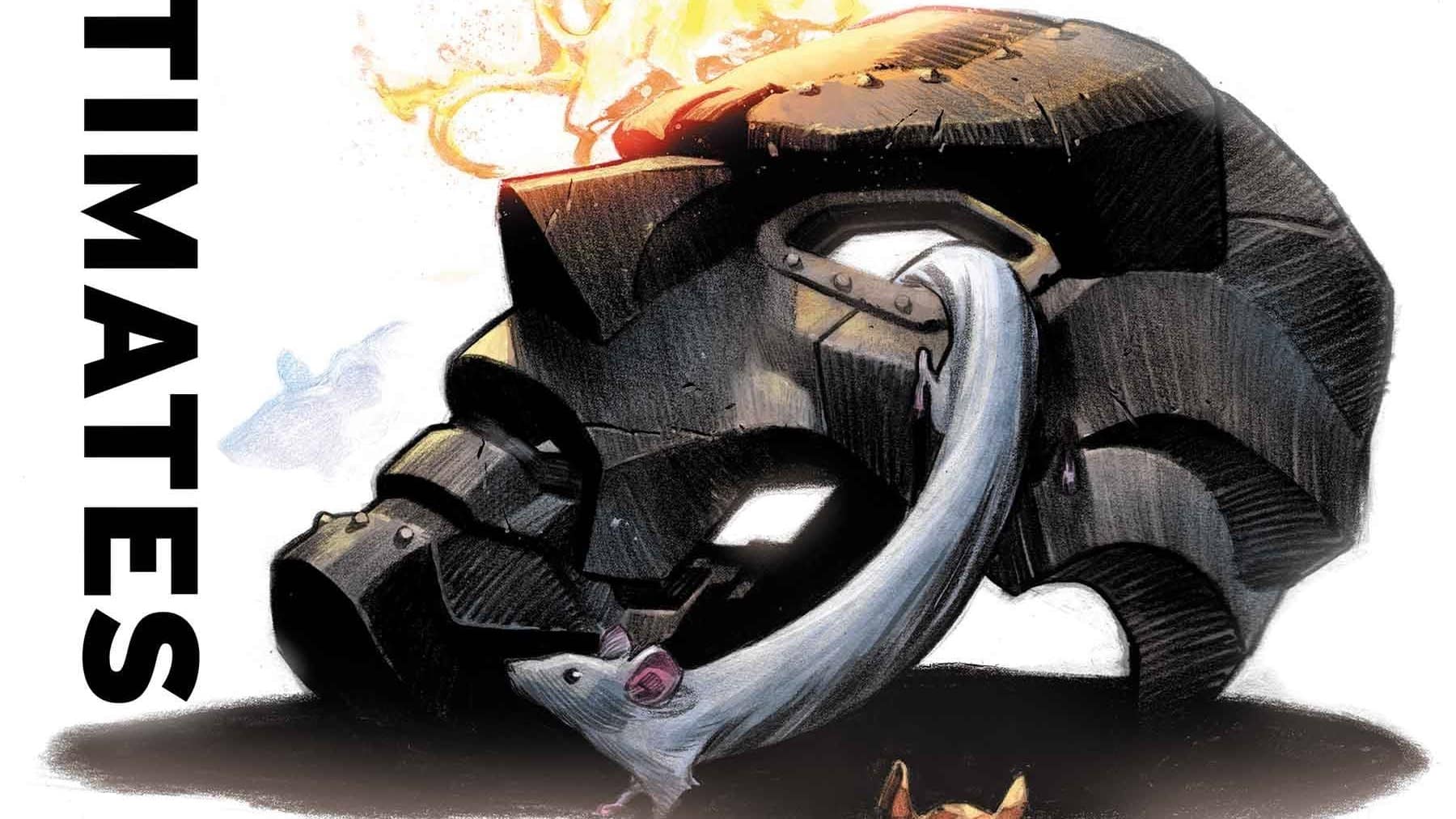Six months ago, Tony Stark sent Peter Parker a radioactive spider to set him back on the course to become Spider-Man. Since then, Iron Lad (Stark), Captain America, Doom, Thor and Sif have begun to do the same for other lost heroes, building a network of super-powered heroes hungry for change…
Now they must band together to destroy the Maker’s Council and restore freedom and free will to a world ruled from the shadows! The Ultimates #1 is written by Deniz Camp, illustrated by Juan Frigeri, colored by Federico Blee and lettered by Travis Lanham.
When I saw the announcement that Deniz Camp would be writing Ultimates, I couldn’t wait to see the writer behind 20th Century Men’s take on the exact sort of characters his and Stipan Morian’s masterpiece was critiquing. After reading the relic of the early 2000s that is Millar and Hitch’s deeply paranoid and cynical Ultimates volume 1, even more so simply because it too in its own way uses the superhero framework to satirise the milieu of the time. I therefore, had a strong and perhaps slightly naive view going into reading this issue of what it could or even should be.
After all, writers don’t get paid to apply some fixed framework that represents ‘their view’ to fictional universes; they get paid to create, develop and in some cases destroy them. Perhaps like when Comrade Platonov or President Goode appear for the first time in 20th Century Men, I was expecting the grandiose political themes to smack me over the head with symbolism and poignancy, but this didn’t happen at first. Ultimately, this is a big two comic. It’s essentially an Avengers comic so it is to quite a large degree what was being satirised in the first place. Maybe I’ve just gotten too used to seeing a man wearing the flag of his country.
Ostensibly this issue is your quintessential team assembly story (which I love as much as the next person): a tale of serious-looking and muscly people deciding what their mission statement and/or gift to the world is, which scientific and emotional breakthroughs will be necessary to achieve it, and who else they should invite into their club to help them with the absolutely critical job that simply must be done at all costs. And it is all of those things, and more. But perhaps only slightly more, at least for now.
An overnight revolution it may not be, but as Cap reminds Iron Lad and Doom “You can’t start a revolution from your living room. Revolutions start on the ground.” And the Ultimates certainly put their feet down in this issue. There’s groundwork being laid here, and Camp and Frigeri begin to establish a world in which a push towards heroism might not be healthy, and may have dire unintended consequences.
Playing god in every universe

The serious people debating the future of their universe in this particular story are Tony Stark and Reed Richards, but not quite as we know them. Walking in his father’s footsteps, Tony dubs himself Iron Lad in tribute to Howard Stark, who sacrificed himself at the end of Ultimate Invasion to trap The Maker in the City for a period of two years. His companion Reed has adopted the moniker and costume of his 616 counterpart’s eternal enemy Doom. They are later joined by a thawed out Captain America, a recovering Thor and his fellow Asgardian warrior Sif.
Their objective is to correct the preemptive damage done by The Maker in rendering all of the 6160 universe’s potential heroes inactive before their origin event. Without the natural course of history there to organically create the perfect set of circumstances – like Peter Parker’s spider encounter, or the Fantastic Four’s space mission, or Madame Web’s mom being in the amazon researching spiders when she died – heroes are not born, they are made. And that leaves Tony and Reed, as they often do, playing god.
Camp explores the theme of godhood pretty explicitly throughout the first half of the issue, building a “world of heroes” on “calculations”, with “near-perfect substitutes” based on probability and a confluence of variables that comprise a superhero’s pathology. The key difference in characterisation between 616 Tony and Reed and their Ultimates counterparts is that they are without bombast and arrogance. Here they are modest and circumspect, drawn by Frigeri held tilted downwards, visibly impacted by their exertions by the end.
Tony is more naive than the cocksure Stark Industries magnate of the 616, but is no less susceptible to believing his own hype. Camp uses the presence of Norse gods Sif and Thor to establish Tony’s growing self-image. Through the narrative caption boxes, Tony is in dialogue with his absent father, initially remarking upon the ‘wonders’ of the gods among them. However, upon commenting on the lengths to which he and Reed stretch themselves to solve the scientific challenge of the Origin Machines, Tony draws an explicit parallel between scientists and gods by remarking upon the fact their creation was achieved on the seventh day: “there are gods, Dad”. Camp leaves the subject of this remark deliberately vague.
Ultimately playing god comes at a cost. In a world of disaffection, where the hope of resistance has been cut at the root, and where the perfect confluence of cosmic circumstances conspire against a human actually wielding the power of a god, many reject the call. Others die. Tony realises he’s gone too far. Reed, however, holds true to the scientists’ maxim of trial and error.
Cap, as he always does, resists these kinds of unilateral changes. In the time he’s been frozen, dictatorship has triumphed over democracy. In this world, therefore, he does not represent the status quo but instead represents revolution, and his idea that it’s people not processes that make radical change should be framed very differently. At first glance it appears that he’s right in the way he’s always right. The common flaw that Camp establishes among them is that, albeit for different reasons, none of them actually understand the conditions they are applying this grand experiment, or revolution to. They don’t know this world.
You do realise she just killed a guy, right?

As we move from the proverbial living room to the ground, we see how the Ultimates’ hypothesis v2.0 plays out in practice. As we meet 6160 Hank Pym and Janet Van Dyne for the first time, dressed in exterminator gear, a sense of determinism is pervasive. As they inspect the bowels of a local restaurant, they come across their intended targets: a family of Moloids. This is a really economical way of establishing two things: the hostile political environment of the 6160 universe and our future heroes’ incompatibility with it.
This is the basis on which Camp builds his universe and his heroes. In Millar and Hitch’s first volume, his heroes were products of the paranoid and superficiality of an increasingly surveilled world. Whatever else you think about that series, its perspective was clear and consistent. Its world was a cynical reflection of our own, as were its heroes. Camp’s conception is different. The foundational property of this world is its absence of heroes, and the cruelty of the world without them. The inhumane treatment of Moloids being perceived as ‘mainstream’ in this world is an example of this, and in another universe would be the inciting incident for Ant Man and The Wasp’s story of heroism.
As it happens here, the Ultimates interrupting Hank and Jan’s conversation about making this kind of change is the catalyst for change in their lives, and its effects are interesting. Jan answers the call straight away, and within minutes has become The Wasp. She does kill a man though, and Frigeri’s lay out supports the casualness with which this is treated in the story by utilising a thin panel to show the act and a cutout of Jan’s figure humorously throwing up a guy’s brains rather than reflecting on what she’s just done. The idea that in a small moment, lost amidst the melee, the smallest person may have shaped the future of this world.
Camp asks the same question but in a different way with Hank. Forced by the rest of the Ultimates to essentially ignore his very valid doubts about his universal counterparts’ transgressions, he finds himself debating determinism vs free will. What’s great about this is that Camp applies another layer of this debate on top. The important question isn’t whether being “A loser at best. A menace at worst” is intrinsic to Hank’s identity, and whether he has free will to be something different, it’s whether or not the Ultimates intervention in his life has set off a chain of causality that would otherwise have been avoided.
While the issue ends in a celebratory mood, with Tony proclaiming “the Ultimates are here. And we’re going to leave a mark”, the question is: what kind of mark? Are those they are recruiting to their cause too damaged by the world that has shaped them to be heroes? Can heroes be made by science rather than shaped by history? Good rarely comes of serious people in labs playing god, and the road to hell is paved with good intentions.
Despite some of the interesting questions being posed by the issue, ultimately the core concept of heroes fighting against the cruelty of its own world is nothing new. Similarly, the dynamics are very familiar to longtime readers, with characters very much recognisable as themselves. If the intention here is to captivate new readers, then it will likely succeed. If Camp was given the space, though, you can’t help but feel as if he could push these concepts further, be bolder in his characterisation, more incisive in his commentary on the genre. On the basis of one issue, the jury’s still out.
Jake Murray spends far too much time wondering if the New Mutants are OK. When he's not doing that, he can be found talking and writing about comics with anyone who will listen. Follow him @stealthisplanet.bsky.social.






